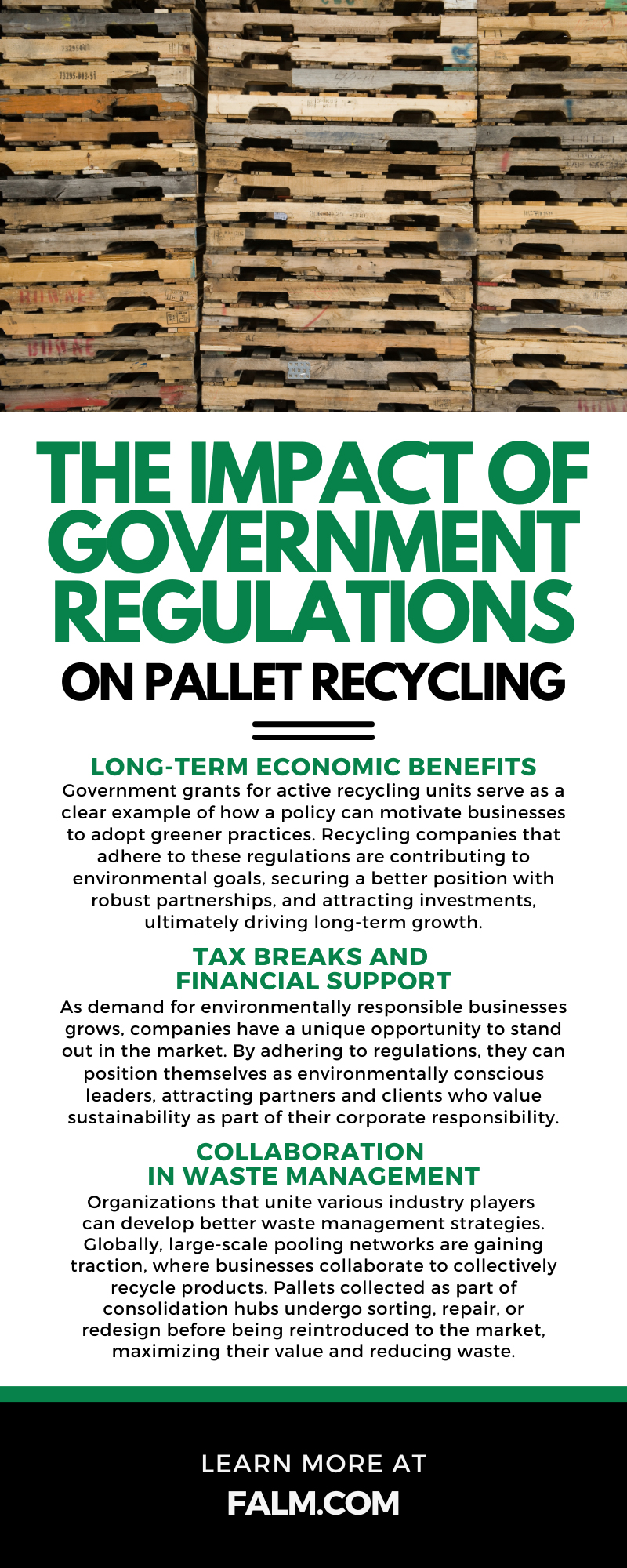In recent decades, the global focus on sustainability has intensified. Governments worldwide are tightening regulations to combat environmental degradation and reduce industrial waste, with industries like pallet recycling feeling the impact. Pallets are vital for large-scale logistics operations, especially in the transportation of goods. However, wood pallets contribute to waste if not properly recycled. This article examines how legislative changes are shaping the pallet recycling industry and the opportunities and challenges businesses face in adopting more sustainable practices.
Government Regulations Shaping Recycling Standards
Governments implement waste management regulations to address rising carbon emissions and unsustainable consumption patterns. In the pallet recycling sector, these laws focus on responsible material sourcing, eco-friendly disposal practices, and ensuring compliance with sustainability standards.
Waste Management Regulations and Carbon Emissions
Restrictions in multiple states across the US now discourage the disposal of wooden pallets in landfills or open dumps, prompting companies to invest in recycling practices rather than contributing to the growing wood waste problem.
Similarly, the European Union’s Circular Economy Action Plan focuses on extending the life cycle of materials, including pallets, by prioritizing repair, refurbishment, and recycling. To comply with these directives, pallet recyclers must adopt innovative, sustainable methods that support a closed-loop economy, reduce excess waste, and maximize the use of recycled wood pallets.
Economic Advantages and Government Support for Compliance
While stringent regulations may require substantial adjustments at first, they bring long-term economic benefits for businesses. For instance, companies that embrace sustainable solutions enjoy perks like tax breaks and subsidies, rewarding their commitment to green policies and boosting their bottom line.
Long-Term Economic Benefits
By extending the lifecycle of pallets through recycling, businesses can reduce material procurement costs. The impact of government regulations on pallet recycling highlights a stronger alignment with circular economic principles, encouraging sustainability and efficiency. Government grants for active recycling units serve as a clear example of how a policy can motivate businesses to adopt greener practices. Recycling companies that adhere to these regulations are contributing to environmental goals, securing a better position with robust partnerships, and attracting investments, ultimately driving long-term growth.
Tax Breaks and Financial Support
As demand for environmentally responsible businesses grows, companies have a unique opportunity to stand out in the market. By adhering to regulations, they can position themselves as environmentally conscious leaders, attracting partners and clients who value sustainability as part of their corporate responsibility.
Challenges for Pallet Recycling Companies
While government regulations bring benefits, they also present challenges, especially for small and medium-sized recycling companies. Financial constraints often make it difficult for these businesses to meet heightened compliance requirements. Regulations concerning waste segregation, energy efficiency, and pallet traceability can require costly investments in audits, certifications, and advanced equipment. This can put added pressure on already tight budgets.
Compliance Costs for Small Companies
Navigating the complex landscape of legal requirements is another common obstacle. Compliance typically involves extensive record-keeping to track the entire lifecycle of materials. As a result, many recycling programs find themselves diverting valuable resources toward meeting regulations, leaving less focus on improving operational efficiency.
Challenges in Record-Keeping and Audit Compliance
Operating across multiple regions may compound these challenges as companies must navigate a patchwork of local, state, or country-specific regulations. This often leads to inconsistent practices, further complicating the supply chain. Despite these hurdles, collaboration between public agencies and private companies has proven to be key in easing the transition toward compliance.
Solutions for Overcoming Compliance Challenges
To lower compliance costs, businesses can tap into shared resources or cooperative programs to invest in necessary equipment. Using technology like automated compliance software can simplify record-keeping and reduce manual labor. Partnering with local experts or consultants helps you tackle region-specific regulations, ensuring smooth, consistent operations. By embracing these strategies, companies can meet regulatory requirements without sacrificing operational productivity.
Growing Importance of Industry Collaboration
With comprehensive government policies in place, no single company can manage these changes alone. By collaborating with recycling firms, logistics providers, and pallet manufacturers, businesses can consolidate resources and expertise. This teamwork facilitates adherence to regulations while creating a more efficient system for tracking, collecting, and repurposing pallets.
Collaboration in Waste Management
For example, organizations that unite various industry players can develop better waste management strategies. Globally, large-scale pooling networks are gaining traction, where businesses collaborate to collectively recycle products. Pallets collected as part of consolidation hubs undergo sorting, repair, or redesign before being reintroduced to the market, maximizing their value and reducing waste.
Standardization and Efficiency Gains
Collaborations to standardize pallet dimensions and materials streamline the recycling process and make compliance easier across industries. These agreements promote consistency, cut material waste, and accelerate conformity with government standards. The result is an optimized recycling system that delivers both environmental and economic benefits while empowering businesses of all sizes to contribute more effectively.
Future Implications of Evolving Regulations
As sustainability gains momentum, future government policies will continue to shape the pallet recycling industry. Global climate action goals are likely to expand, addressing more environmental solutions beyond just material recycling. Businesses must prepare for stricter requirements, including advanced emissions tracking, water usage reductions in production, and even carbon offset initiatives.
Preparing for Future Regulatory Changes
Technologies like AI-driven waste sorting and blockchain-based material tracking will play an integral role in meeting compliance requirements. Early adopters of these innovations will gain a competitive edge over peers by delivering seamless compliance and pioneering effective waste-reduction strategies.
The impact of government regulations on pallet recycling will continue to fuel innovation among environmentally conscious industries. Businesses that stay ahead of shifting legislative priorities by embracing forward-thinking solutions will ensure compliance and thrive by prioritizing both operational sustainability and high standards of performance.
Building a Reputation Through Sustainability
Adhering to government regulations empowers the pallet recycling industry to take the lead in environmental stewardship, driving the circular economy and helping industries combat climate-related damage while prioritizing long-term over short-term profit.
By setting benchmarks for effective material recovery, these businesses build a strong reputation and attract loyal customers committed to supporting sustainable practices. As businesses face increasing regulation, those who adapt and innovate won’t just stay compliant—they’ll lead in sustainability and set the standard for the industry in the years to come.
Partner With Industry Experts
Adapting to evolving legislative frameworks requires collaboration with trusted industry leaders. First Alliance Logistics Management can help you stay ahead of changing pallet recycling regulations and optimize sustainable material management. With expert logistics support, reliable compliance monitoring, and individual solutions for each client, FALM ensures your business meets its recycling goals efficiently and cost-effectively.
Don’t wait for regulations to impact your operations—speak with First Alliance Logistics Management today to unlock scalable solutions that turn compliance challenges into strategic advantages for your business.


